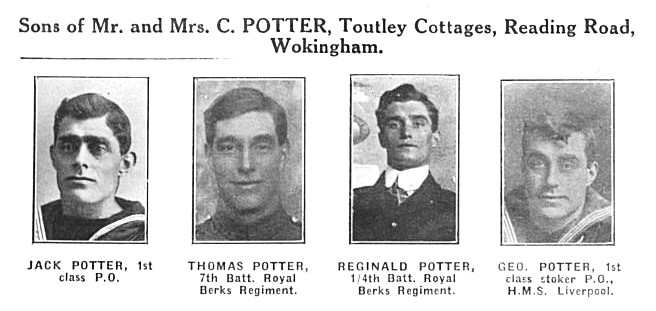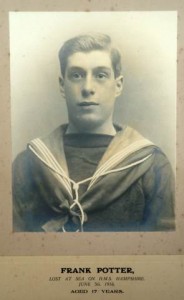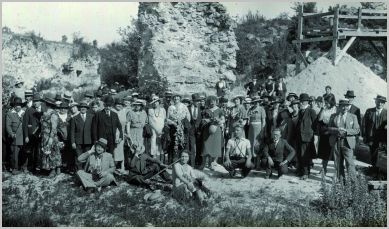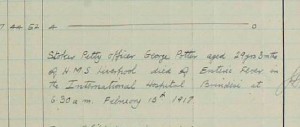Six brothers of Emmbrook’s Potter family joined the Great War. Only three returned home and two badly injured. Anna Matthews is the Great Grand Niece of the Potter brothers; her Great Grandmother was their sister Bertha. Anna share’s her thoughts of the impact on families then and now.
“One hundred years ago, the world was on the brink of a war that would see over 10 million men lose their lives. Over 10 million – and every one of them someone’s son.
I’m going to tell you the story of one family. In 1914, one hundred years ago, Charles and Fanny Potter, who lived in Wokingham, rural Berkshire, had a family of seven sons and three daughters when the First World War broke out. Over the course of the next two years, Jack, George, Tom, Reginald, Percy and Frank all signed up to fight in the war, just like millions of others, not just in this country but around the world. Only Arthur stayed behind with his sisters because he was too young to fight. Can you imagine how Charles and Fanny must have felt, six of their seven sons heading off to war? Pride, no doubt. But also fear and worry about what might happen to them, spread out all across Europe, not even able to look out for one another.
Gradually, Charles and Fanny began to receive news of their sons. First came news of Frank. Frank was ‘Boy First Class’ in the Royal Navy, serving on board HMS Hampshire alongside Lord Kitchener himself. In July 1916, HMS Hampshire sank off the coast of Orkney. Frank was lost at sea. He was only 16 years old.
Heartbroken, the family then received news only a few months later of the death of George. George had been serving in Italy as an engine stoker on board HMS Liverpool. Aged 29, he left behind his own wife and son.
A month later, in March 1917, Charles and Fanny heard that Reginald, who had been severely injured, was to have his leg amputated. He’s 23. And at the same time, 19-year-old Percy was also in hospital, badly wounded.*
To top it all off, at the end of this year – 1917 – they heard that Tom, aged 29 and a corporal in the Royal Berkshire Regiment, had been killed in the Battle of Poelcappelle in Belgium. His body was never found.
Five of the six fighting sons: casualties of the First World War in just 18 months. Six sons sent, three killed, two wounded. How does a family move on after that? And how do the young, wounded soldiers adjust to civilian life as disabled ex-servicemen? Their lives are absorbed with remembrance.
The war ended in 1918. In the 1920’s, Fanny participates in the unveiling of a memorial to her three dead sons in their local church. A decade later, Jack, the eldest son and the only one to have remained physically unscathed by the war, can be found helping to count the church donations on Armistice Day, no doubt remembering his brothers and all the friends that he lost.*
And what about the girls, whose role in life should have been to marry and settle down, when so many men had been killed and they had so much grief to bear? One of the Potter daughters, Bertha, did marry and had a son that she named Frank, in memory of her younger brother, lost at sea.
This Frank grew up and fought in the Second World War. He survived to have a family of his own. This Frank is my grandfather. The Potter brothers were his uncles. The First World War is not so distant.
Over the next four years, you’ll hear a lot about the war, as Britain commemorates the centenary. There’ll be art exhibitions, documentaries and dramas on television, theatrical productions, services and ceremonies and no doubt the odd politician chipping in here and there as well. This national commemoration is important, and significant.
But as you hear of and experience these things, spare a thought for the Potter family. The boys who fought and never came home but also the boys who fought and survived, and Charles and Fanny and the other siblings who had, somehow, to live out the rest of their lives with so much lost. Remember the personal stories and the stories of other families not yet told. Because, as more than 10 million men died, the chances are that they are the stories of your families”.
Anna Matthews 20 May 2014
*with thanks to the following publication:
Bell, Jim (2013): Wokingham in the News: A Chronological History of Wokingham from the Reading Mercury, 1858-1938. pp.176, 204, 347. Accessed online at http://www.wokinghamsociety.org.uk/Boxsoft2/Wokingham_in_the_News.pdf
Follow me on Twitter @exeteranna and @GreatWarDiary





I have found the HMS Liverpool log report in which it states that George POTTER was at the International Hospital Brindesi when he died 15th February 1917 at 6.30am. I expect Anna MATTHEWS knows this already but I shall email her anyway on the basis it is better to get something twice rather than not at all!
Peter Shilham
Pingback: Remembrance Sunday | Anna R Matthews: Composer